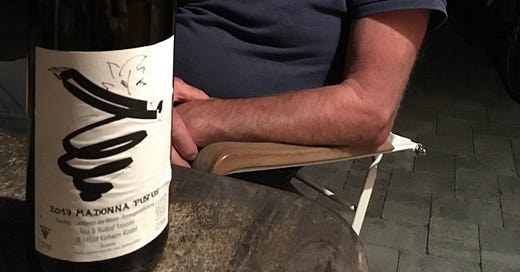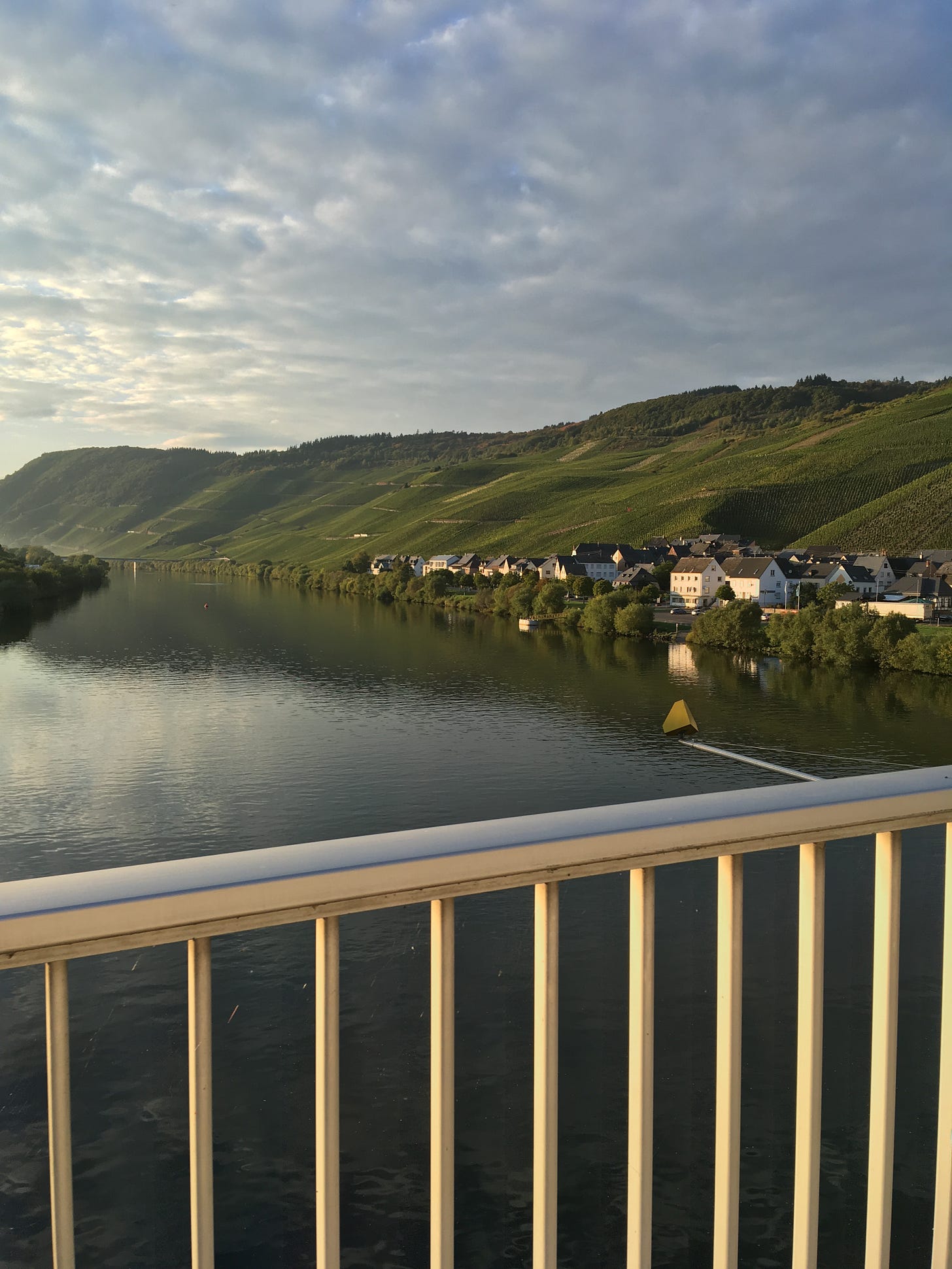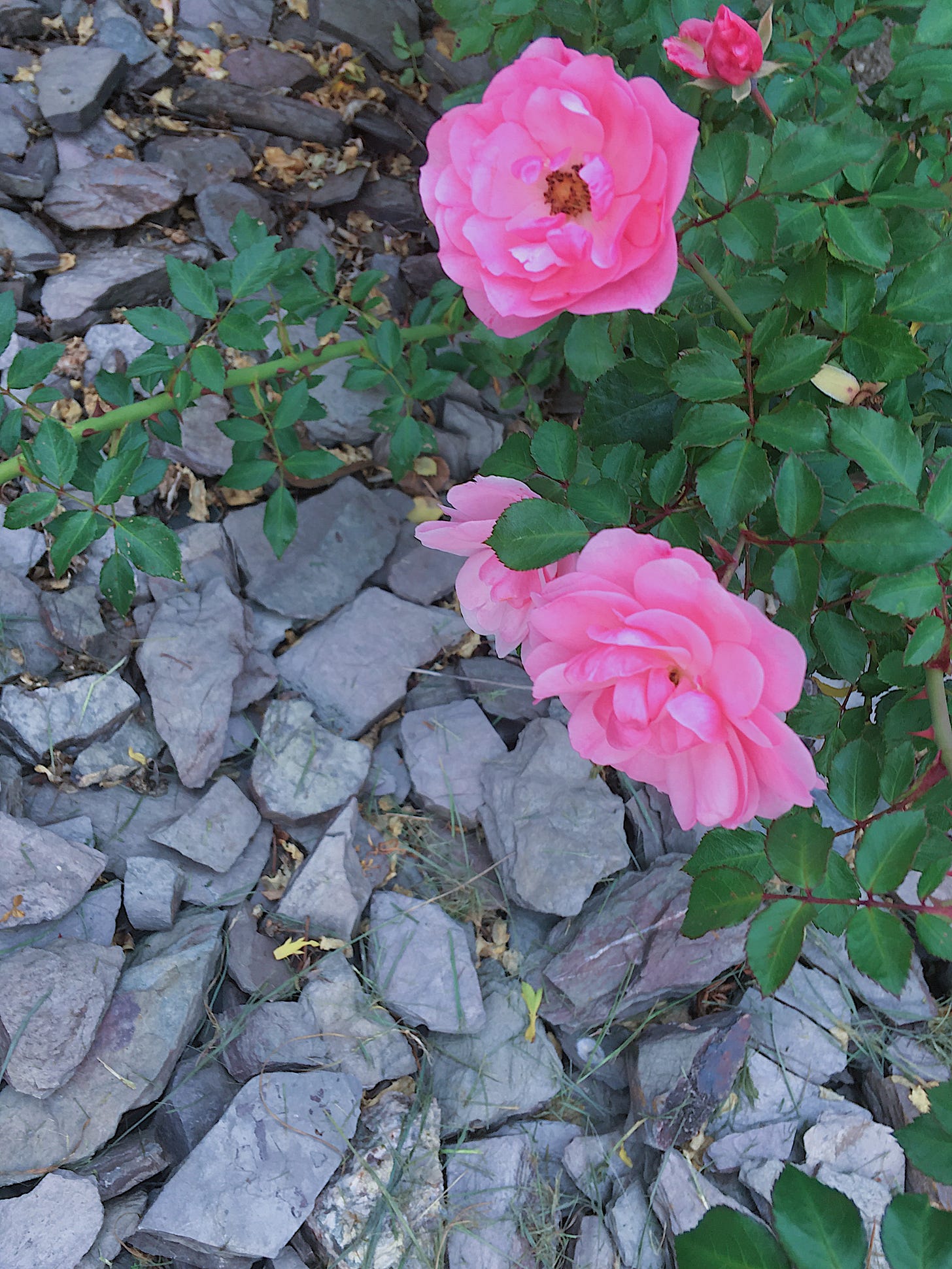Welcome and thank you for being here.
In the 9 months since I’d last seen the Trossens, I’d forgotten how to make my way up the short path through their overgrown, biodynamic garden, to the mustard-yellow house where I’d stayed for the 2017 grape harvest. Rudolf Trossen waved from behind a bunch of vertebrate sunflowers. He says ‘hello’ in German and my travel companion looks around for the source of the voice, questioning her approach, too.
Past some trellised, sun-soaked, grape vines, near the half-timbered entryway, sits the long and faded tasting table where I’d quietly shared a few Mosel lunches and dinners (buttery cheeses, cured meats, mustards, apple and horseradish spreads, dense black bread, sausage, blood sausage, white sausage, soft, hard, thin, thick, spicy, sweet sausage…) after a long day of picking Riesling on the steep river banks, all covered in shattered, slate tiles, gray and iridescent blue.
I knew this bright and quiet place, but the arrangement was different. Rudolf smiles at my friend and me, either charging up his practiced English or holding the moment still for some poignancy, which he likes to do. He’s prone to slowing things down. He does it with a grace and charm that only seldom yields a tone of severity that the blue-eyed farmer wears well.
I hate to be verbose, but it’s a place that lends itself to a sense of presentness I rarely get to enjoy in New York. It’s a place I visit regularly in my mind, and far too little in person. I was there to visit a friend who'd changed everything I knew about the world, in ways I’m still trying to sort out.
Back in those days, near the end of my retail tenure at Uva, at the start of my career as a traveling salesman, I was excited about wine but lost in a lot of insecurity and ignorance. Still, I was extremely lucky to have a lot of guides and teachers, none less formative than Mr. Phil Sareil. Very early on at Uva, Phil seemed to take a shine to me. In 2012/3, he was becoming very interested in Germany and Austria, since I’d lived nearby in college, maybe he thought he might be able to inspire a young and hungry wine professional (i.e. stock idiot).
Today, years later and myself a cynical salesman, I know that Phil was under the mistaken impression that I might have served as some kind of stepping stone on the road to a sale, but only God can judge a man, even a salesman.
I remember standing awkwardly at the table, with the first three fingers of my right hand hooked around the back of a splintered and knobbed chair, faded gray by the sun. Rudolf wasted no time, pulled a bottle of Pet Nat from the fridge, and poured three glasses. It was about 4:30pm and we had just finished a 3.5 hour drive from Cologne where the 2018 summer seemed to be baking the famous Domm Cathedral. We sat in an ancient brewery, hydrating with sweating beakers of cold Kölsch. I couldn’t remember the weather being so warm in this part of the world.
But weather is funny then and since, and as I sit down across from my friend and farmer, we’re slowly abstracting from the anecdotal nature of ‘weather’ towards ‘climate’, his climate, his terroir, and “how’s the seasons going for you?”
“Early,” Rudolf says after a very long pause. I’m reminded of his pace and I’m trying to adjust. My friend looks concerned with the beat, and drinks.
“We had a very good spring, but it has been very hot. And we need rain.”
Phil was the reason I found myself back in the Mosel Valley. He would taste with me long before I had any buying influence and insist that I taste certain wines during the more sanctioned gustations. One cloudy afternoon on that glass corner of North 6th and Bedford, Phil brought in bottles of the Trossen wines for the first time. Unbeknownst to me, he’d been talking them up for a while, so all the buyers were there and interested.
Nearly every bottle was a disaster. All of them were flawed in one way or another, and some of them so spectacularly that I was educated on things like rope taint and TBA infections. Our buyers, who could be tough, slowly had the weight of spending any of their precious budget lifted. They started to laugh. The wines were funny.
Phil was not laughing. All these years later, it’s easy for me to put myself in his shoes. For the first and only time, I saw Phil sincerely upset — not angry, but disappointed that we couldn’t see what was so clear to him.
“You guys don’t like natural wine. You don’t get it.”
That prompted laughter too, from Phil as well. It was a funny situation. Some wines show kind of funny, and to me, this was just one of those moments. Phil started shaking the ropey strands out of a bottle and tried to educate us. Gas sprayed from out from the space between his thumb and the neck of the bottle. That was funny too.
I wouldn’t be laughing long. A few nights later, Rene and I would close the the shop and walk over to the Four Horsemen where Billy would greet us with that same cuvée of Pet nat. Of all the ways I’ve embarrassed myself in front of Billy, this was the only reproach I ever suffered in front of the man. (This says a lot). My skin crawls as I remember saying, “You guys bought this wine? They are all completely fucked-up!”
I found out in that moment that Billy was from the south.
“Y’all are haters over there.”
He said some more warranted things and I felt totally ashamed. My last week at Uva, Phil ventured to right this great wrong and asked if I would like to go do harvest with Rudolf that next fall. In that short moment, it was so obvious how ignorant I had been. Just the thought of a man picking grapes to make wine, the reality of it, showed me the breadth of what I was missing, and I went.
Most of that 2018, summer trip was very difficult. It was incredibly hot and people were praying for rain through the rest of the visits, moving south through Luxembourg and into France. I recall that Rudolf liked to say that he hadn’t had a “normal” vintage in 12 (now 21) years. He’s purposeful in his language and emphasizes the fact that “climate change” is a far more complex than we understand, or at least it isn’t just one thing. Making a consistent wine in capricious vintages is a problem, even with 30 years experience.
It’s difficult to know what to do: When do you treat the vineyards? What treatments are justified? When do you pick? Should you hold out for that rain in the forecast? Will it rain too much and drown the fruit?
I got to see how self-evidently difficult the task of honestly sustainable agriculture really could be. And for the winegrower, it isn’t enough to get some quantity of edible fruit. He needs healthy, clean fruit of some quality, deserving of the name he’s built for himself, but also the name of the ancient wine growing region imprinted on each of this bottles with a legal scrupulousness that is aptly described by the word, ‘German’.
Which renders a further, cultural obstacle clear: as Rudolf and Rita turn their backs on the technological convenience of industrial agriculture, and the stylistic hegemony of Modernist vinification, so too does he invite the ire of his winemaking neighbors, who in the middle-Mosel consistently produce some of the most prized wines in the world.
We’re looking Northeast, across the Mosel River at the famous vineyards of Kinheim, around the bend from Graach, just north of Bernkastel and Wehlen. It’s a special place. The river is like a sine wave and each turn folds over on itself beneath steep, vine-trellised slopes. It’s a funny sight, paring natures softest curves with the kind of dot-matrix laid on top. It’s a romantic place whose beauty and contradiction is reflected in the tension of its Riesling. What may well make Mosel Riesling the best in the world is this paradox of tension and transparency — wines of rich, decadent fruit bound up in an uncompromising structure of racing acidity and mineral clarity. Mosel wines are special to wine lovers because they are very obviously of a place, and very happily that place is a beautiful one.
Trossen knows this and makes very little apology for his dedication to this place and to this grape. He’s pointing out his plots. They are called, “Lay,” “Scheifer-Stern,” Schiefer-Gold,” “Pyramid,” “Eule,” and “Madonna.” Each has their idiosyncrasies, tells their story. Rudolf and Rita’s approach to the question, what kind of story can you tell about an arbitrary plot of dirt in the middle of nowhere? was and is surprisingly unique.
Though I hand’t been smart enough to ask, this was the very first question Rudolf set out to answer when we had first met during harvest, when he first picked me up from the train station. It’s a question he began lecturing on that afternoon at the table outside his home as well, and many times subsequently.
“It’s a funny little plant. Thousands of years and generations of dedication to hear what this weird little vine has to say. You couldn’t say the same about the carrot.” He luxuriates on these words. They come out slowly.
And while you might argue that the predominance of grape juice is maybe an arbitrary one, there is still something compelling about this line. The mind bending difficulty of the vintage growing before our eyes was just one case-in-point.
But Rudolf and Rita have a better reason. They communicate with their plants, in a holistic communion of biodynamics practiced without pretense or irony. Where so many of the winemakers I’ve met will utilize this or that technique of Biodynamics (almost always making a hand-waving apology for referencing the concept) Rudolf is a true scholar of Steiner who was maybe one of the first to adopt his practices in a modern, commercial vineyard. His dedication to this philosophy is fascinating and impressive, and his metaphysics is one of universal love and idealism.
The world according to Trossen is a thinking, feeling one, from the stones in his vineyard to the vines, the strawberries, the roses, and us. The world is a mental thing, with consciousness at its root, not a physical one. Discussing idealism, telepathy, reincarnation, meditation, Saturn, its clear that this Biodynamic garden is a bit different than most of those you hear about with a Demeter certification. Trossen likes to say that he might have lived a past life building the pyramids, or defending the Alamo. “Why not?” he says, slow and wry.
In all of our discussions, in the books and articles we shared, I got the impression that his mission was to make wild my staid consciousness. He wanted to liberate me to dumb ideas and ways of being conscious that were redundant or frivolous. He gave me the gift of doubt, something different than rational criticism. Why did the wild strawberries, fennel, and clover make his wines so much more transparent and beautiful than his neighbors who killed everything but the grape? For many interesting and useful scientific reasons, surely, but also because the idea is good and beautiful. At least as wine is concerned, we don’t risk too much in acquiescing to beauty.
With great joy, I’m slowing drinking the latest arrivals from the Trossens. Simultaneously, I’m enjoying our New York, winter flu, and this mind-boggling podcast that puts me right back at that table with Rudolf.
I’ll end with some nice words from my friend. Please enjoy these wines when you can. They are a treasure of beauty and freedom:
Used carefully in the correct dose and attitude, wine can be an incredible medium for the awareness of quality as it allows us to fine-tune our senses to a broad spectrum of aromas and flavors. It also allows us to dig deep into the very essence of the place and the time of its origin. Wine in its purest form, by only using what is essential, in search for the unmistakable, the authentic, the desire for the kiss of terroir, the essence of the wine, in the grape, the time and place of the workmanship transported, pure and undisturbed, longing for the taste of eroticism, it is this truth in wine, that will remain and bring joy. In the kitchen as well as in the cellar.
Further Reading
Jaynes, Julian. The Origin of Consciousness in the Breakdown of the Bicameral Mind. Houghton Mifflin, 2003.
Kühlewind, Georg, and Michael Lipson. From Normal to Healthy: Paths to the Liberation of Consciousness. Lindisfarne Books, 2023.
Steiner, Rudolf. Philosophy of Freedom. Lulu Com, 2011.













I'm blown away by the beauty of this profile-reflection. Anyone who has spent time at 7 Bahnhofstr. will instantly recognize the irridescence pinned to the page here like a blue morpho. Gorgeous.